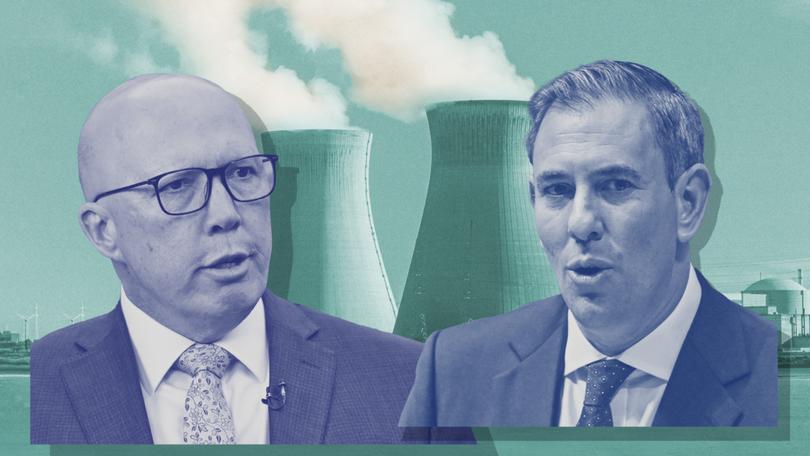Blackouts, busted drills and a nuclear blow-up — proof Australia’s power policies are a shambles
If you had any doubt over how fraught, loud and divisive the energy wars are going to become, not just ahead of the next Federal election but in decades to come, you need only look to two news stories.

If you had any doubt over how fraught, loud and divisive the energy wars are going to become, not just ahead of the next Federal election but in decades to come, you need only look to two news stories that broke on Wednesday morning.
As we learned that Florence the tunnel-boring machine has become wedged in rock at the Snowy Hydro 2.0 project and work will be halted for an indefinite period, Opposition Leader Peter Dutton and Treasurer Jim Chalmers engaged in a furious verbal fire about a new report on the cost of Australia adopting nuclear energy.
Abolishing Australia’s nuclear ban and establishing seven small nuclear reactors on the site of disused coal power stations is the Coalition’s signature energy policy.
Sign up to The Nightly's newsletters.
Get the first look at the digital newspaper, curated daily stories and breaking headlines delivered to your inbox.
By continuing you agree to our Terms and Privacy Policy.The plan remains light on detail and promised costings ahead of the May Federal Budget failed to materialise. However, the CSIRO has crunched its own numbers and on Tuesday night released a report on the cost of large-scale reactors.
The CSIRO’s GenCost report found it would be at least 15 years until nuclear was possible in Australia, and at a cost of almost $17b it would be unviable.
“I think the CSIRO has completely torpedoed this un-costed nuclear fantasy of Peter Dutton’s,” Dr Chalmers said.
“Peter Dutton won’t tell us where the reactors are going to go, which suburbs, which regions, which towns, which cities are going to house Peter Dutton’s reactors and the madness of this, I think, is laid bare in the CSIRO report.”
Repeating that it was time to have a “sensible conversation” about nuclear energy, Mr Dutton said potential sites would likely be welcomed in areas with defunct power stations because this would support “a continuation of their jobs”.
“If you look at the top 20 economies in the world, Australia is the only economy that hasn’t adopted nuclear power, or hasn’t signed up to it,” Mr Dutton said in Perth.
“So just ask yourself the question, do you think those 19 countries have got it wrong? And Chris Bowen and Anthony Albanese, you’ve got it right. I don’t think so.”
Energy expert Alan Lawrenson said the Coalition plan differed from that studied by the CSIRO and that small nuclear reactors could be available sooner at a lower cost.
Labor describes the Coalition’s plan for small modular reactors as a fantasy because the technology doesn’t exist yet, although multinationals including Westinghouse say they are on track to develop them within a decade at a cost of $1b a piece.
Mr Lawrenson, who has worked across tech and energy and written a book titled Australia’s Looming Energy Crisis, said while he was broadly supportive of the Federal Goverment’s energy policy, he has long been a critic of Snowy Hydro 2.0.
The new drilling failure at the $12 billion Snowy 2.0 hydropower project follows several delays.
The Government-owned Snowy Hydro Scheme confirmed that Florence was blocked in hard rock and that an update would be provided next week.
“I have spoken to a number of geologists that have worked in that particular area and they say they’re some of the hardest rocks in Australia. And therefore the progress they need to make that they will make in parts of that will be extremely slow,” Mr Lawrenson said.
“I don’t think that particular project will ever produce kilowatts or megawatts of power, I think the project will be canned before it’s finished, because the cost overrun will be immense.”
All of this came the day after a report from the energy market regulator warning of potential blackouts over the summer if NSW presses ahead with the closure of Eraring, Australia’s biggest coal-fired station.
The Australian Energy Market Operator said lags in implementing wind, solar and battery alternatives to fossil fuel would lead to the “reliability gaps”.
Of course where these questions will really heat up is if power prices keep rising, a fact reiterated on Wednesday by Alinta CEO Jeff Dimery, who said at the Australian Energy Producers conference that Labor will struggle at the election if consumers don’t see actual relief.
“I think the Government will lose the support of the community and industry will lose the support of the community if we can’t manage this transition in a cost-efficient manner,” Mr Dimery said.

